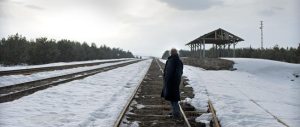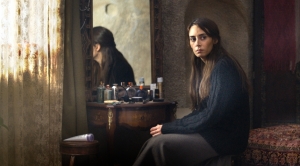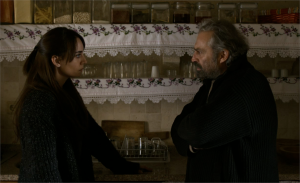As a cinema enthusiast and a recent lover of all things Turkish, I have been eagerly awaiting the UK release of Winter Sleep (Kış Uykusu), the latest Palme d’Or winning film by Nuri Bilge Ceylan. My first encounter with the director’s work was with Distant (Uzak) a few years ago. I have since discovered Three Monkeys (Üç Maymun), Climates (İklimler) and the incredible Once upon a time in Anatolia (Bir Zamanlar Anadolu’da). Until recently, the latter was my favourite of his. In a story in which so little actually happens, it shows enormous skill when a film grips the audience with a simple humorous telephone call between a policeman and his worried wife, or truly exhibits the chilliness in the hills that the characters feel while driving through them – all without noticing how long these sequences are.
A trend that one notices throughout the director’s films is a serious lack of communication, most often amplified by a lack of dialogue. In Winter Sleep, while dialogue is certainly not missing, communication still is.
Aydin, a rather intellectual retired actor is living in his deceased father’s lovely stone home, which he has turned into a hotel, in the middle of Cappadocia with his sister Neclâ and wife Nihâl. This story takes place in the depths of winter; the hotel where Aydin lives and the surrounding villages and hills are covered in mud or snow. Winter is known territory to Ceylan, and many can probably agree that this is where his strength lies.
Aydin supports his wife financially while she does charity work for a local school. As well as owning his cottage, he owns a few houses in the village, one tenant of which cannot pay rent.
As Ceylan did in his previous films, he pleases the audience with his now famous cinematography. While there are fewer exterior scenes than in Once upon a time in Anatolia, we do see enough to grasp the beauty of this Anatolian region in the winter, although I must say I will probably prefer going there in the spring or summer! The choice of season and grotto-like location are essential to show the trap in which the characters are or feel they are. While I mention a trap, I believe it is a necessary trap: you can’t always just run away from reality and must deal with where you are at the moment.
The actors chosen for this film needed to be on top of their game due to the weight of dialogue and layered emotions, and the casting is certainly impeccable.
I believe my favourite scene was the long philosophical conversation about religion, writing and work between Aydin (Haluk Bilginer, who I was lucky to witness as Antony on the Globe stage during the 2012 Globe to Globe festival) and his sister Neclâ (Demet Akbağ). While the scene was long, each word was necessary and although voices were not too raised, tension built in the way they can only build between a brother and sister: it’s okay to hurt the other because the family connection will always be there. It’s a chance to hopefully accept criticism constructively.
What is also common to all of Ceylan’s films is the extent to which the audience feels they are entering someone’s life so deeply. Nothing is too rehearsed, too set in stone, everything is flowing. The films show so much humanity and spontaneity in this way, it’s beautiful. Ceylan described the amount of writing he and his wife did on the dialogues in Winter Sleep. This time, it was essential that the actors did not change a single word. It is admirable to notice how this amount of work led to this kind of naturalism.
I don’t even understand the language, I hear you say! Is it cheesy if I reply that this naturalism transcends language barriers? As is the case with Shakespeare or Chekhov, I’ve learned, notably thanks to Globe to Globe, that understanding language is actually secondary if the acting is good.
While you first see Aydin as a confident man enjoying the leadership over his home, the fact that he can’t just sit down in front of his wife without there being a constant defensive power struggle is certainly a weight for him. The moment where he hears that his wife is coming over from the other side of the cottage (can I call this a cottage?) and you can see his eyes light up and his lips, actually hidden behind his beard, curl up, you know how much he loves her. She is what keeps him sane, in a way. Everything around that is meaningless, and yet he can’t have a normal conversation with her.
Another sign that something is not quite right despite his confident manner is the amount of reassurance he needs from the ones around him. Is his writing good enough, he asks his sister about all of his written work. Should he be charitable to a local women’s shelter, he asks his wife, who discourages him despite the importance she puts on charity – dangerously so, as we find out later in the film.
The theme of power is also present in the difficult financial situation which exists between Aydin and his tenants. This is especially apparent when the tenant’s brother, Hamdi (Serhat Kılıç), keeps visiting Aydin to insist that the family will pay their debts, that they are honourable. Aydin is uncomfortable with these ceaseless visits and brushes Hamdi off, explaining that he doesn’t usually take care of financial matters – his assistant does. This situation reminded me of A Separation (by Iranian director Asghar Farhadi), in which social status plays a role in relationships and in understanding what is important to individual characters. Again, I’d like to compliment actors Kılıç and Nejat İşler for their uncomfortable, sometimes terrifying portrayals of the two brothers living in the village.
Although the dialogues are long, they do not overwhelm with too much information, and sometimes monologues seem that although they are said out loud, the character could just be talking to him or herself. The three principal characters know each other very well but each of them feels an internal dis-ease of their own. As a result, they are unable to be true to their family, and worst of all, to themselves.
For example, one never feels that this is the place for the two women. Although they may feel they are forced to live here, this is a lie they are telling themselves. They could leave in a second, and are certainly imaginative enough to support themselves and start over.
One of the things that certainly resonated with me is that no matter how hard things get, connection can really save us. This theme isn’t new, but Ceylan succeeded in portraying this in an especially intimate way.



Pingback: The Wild Pear Tree (Ahlat Ağacı, 2018) | the balcony